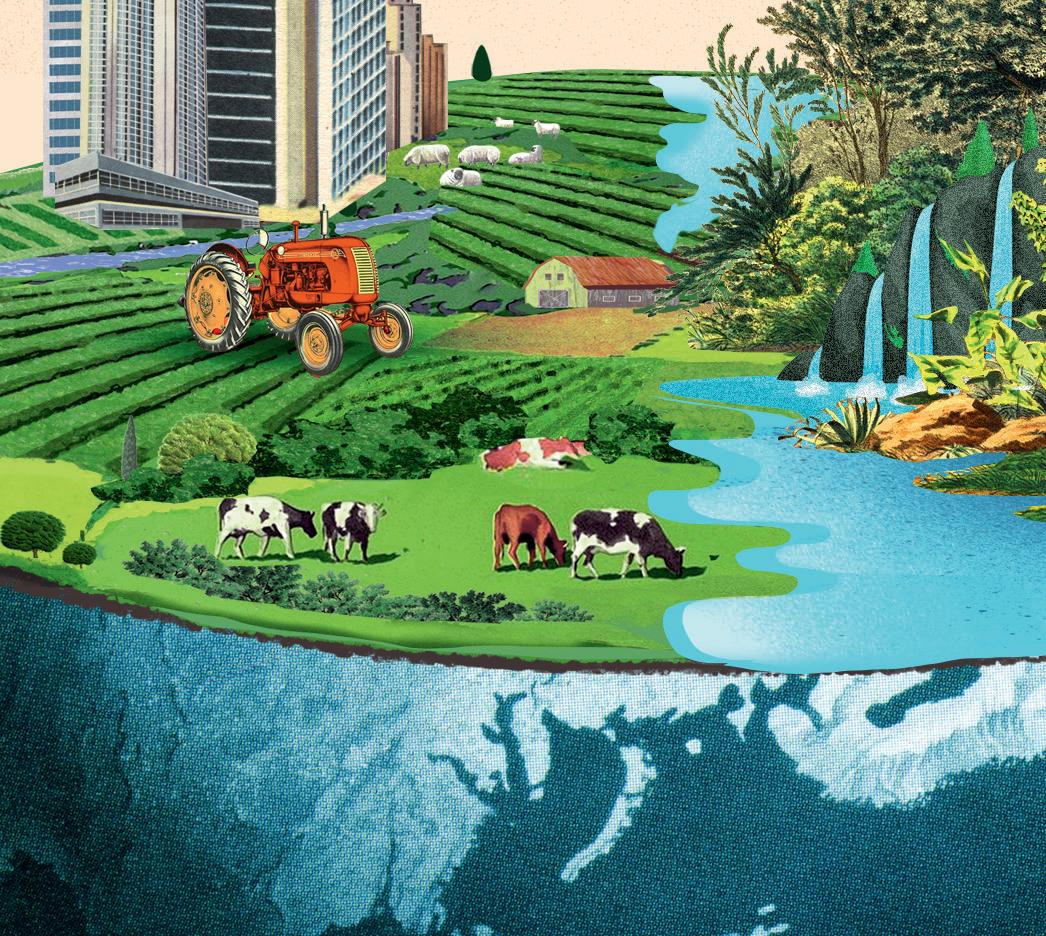
The story of the biodiversity crisis starts with a cold-case murder mystery that is tens of thousands of years old. When humans started spreading across the globe they discovered a world full of huge, mythical-sounding mammals called "megafauna", but by the end of the Pleistocene, one by one, these large animals had disappeared. There is no smoking gun and evidence from ancient crime scenes is - unsurprisingly patchy. But what investigators have learned suggests a prime suspect: humans.
Take the case of Genyornis, one of the world's heaviest birds, which was more than 2 metres tall and weighed in excess of 200kg. It lived in Australia until, along with many other megafauna, it went extinct 50,000 years ago. In North America, giant beavers weighing the same as a fridge and an armadillo-like creature called a glyptodon, which was the size of a small car, existed until about 12,000 years ago, when they, too, went extinct. In all, more than 178 species of the world's largest mammals are estimated to have been driven to extinction between 52,000 and 9,000BC.
These extinctions happened over hundreds or thousands of years, so it is unlikely people back then recognised it as a crisis. But, in some cases, the loss of these animals would have had landscape-scale impacts.
For a long time, the extinctions were thought to be linked to natural changes in the environment until palaeontologist Paul S Martin put forward his controversial "overkill hypothesis" in 1966. This stated that humans were responsible for the extinctions of megafauna, destroying the romantic vision of early humans living in harmony with nature.
By 10,000 years ago, when humans had spread across every continent except Antarctica, there were at most 10 million of them-so a lot of change had already been dished out by few people.
This story is from the December 02, 2022 edition of The Guardian Weekly.
Start your 7-day Magzter GOLD free trial to access thousands of curated premium stories, and 8,500+ magazines and newspapers.
Already a subscriber ? Sign In
This story is from the December 02, 2022 edition of The Guardian Weekly.
Start your 7-day Magzter GOLD free trial to access thousands of curated premium stories, and 8,500+ magazines and newspapers.
Already a subscriber? Sign In

Is Paris Ready To Embrace Its Olympic Moment?
In a live television interview from Paris’s Grand Palais – the centrepiece of this year’s Olympic Games, which open on 26 July – Emmanuel Macron set out his ambitions for the country’s athletes in much the same way he might outline a political manifesto.

Can Britons Learn To Love The Idea Of The 'Nanny State'?
Despite detractors, Rishi Sunak’s tobacco bill shows the public will support policies that would once have been thought draconian

Battle Ready How Might New US Aid Change The War?
After months of stalling, the US House of Representatives last weekend approved more than $61bn of military assistance to help Ukraine in its fight against Russia, as well as billions for other allies including Israel and Taiwan.

What are the rules of thumb for buying a quality kitchen knife?
I need anew chef’s knife any recommendations? Nothing too expensive, though.

Keep it reel Clubs drive a celluloid resurgence
A ballooning number of groups dedicated to cinema in its original medium are springing up across the UK. They explain its thrills and challenges

I'm begging world leaders to raise taxes for rich people like me
The need to tax rich people like me has never been so dire. Extreme wealth concentration in the hands of a few oligarchs is a threat to democracy the world over.

Troubled waters
In an unprecedented deal, a private company bought land in an Arizona town - and sold its water rights to a suburb 300km away. Have the floodgates opened for US corporations to cash in on drought?

Melania is back-but she's still not playing by the rules
Her biggest fashion statement as first lady was a green jacket emblazoned with the words, “I really don’t care, do u?” More recently Melania Trump has given the impression that she doesn’t care whether her husband, Donald, returns to the White House. That is about to change.

Poll prejudice In a big voting year, where are all the female candidates?
With more people set to vote in elections than at any time in history, 2024 is being touted as a test of democracies’ strength around the world. But one thing remains in noticeably short supply – female leadership candidates.

The man who helped scores to flee violence in Darfur
Every night, for weeks at a time last year, Saad al-Mukhtar put a small group of people in the back of his Toyota Land Cruiser and drove them under the cover of darkness from his home in the Sudanese city of Geneina across the border and into Chad.